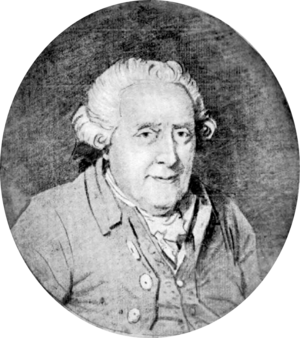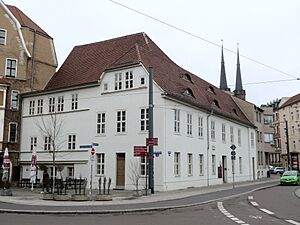Wilhelm Friedemann Bach facts for kids
Quick facts for kids
Wilhelm Friedemann Bach
|
|
|---|---|

Sketch of Wilhelm Friedemann Bach
|
|
| Born | 22 November 1710 |
| Died | 1 July 1784 (aged 73) |
Wilhelm Friedemann Bach (born November 22, 1710 – died July 1, 1784) was a talented German composer and musician. He was the second child and oldest son of the famous composer Johann Sebastian Bach. Even though he was a brilliant organ player, a great improviser, and a composer, he often struggled to find steady work and enough money. He sadly passed away in poverty.
Contents
His Early Life and Education
Wilhelm Friedemann, often called Friedemann, was born in Weimar, a city in Germany. His father, Johann Sebastian Bach, worked there as an organist and musician for the Duke of Saxe-Weimar. When Friedemann was nine, his mother, Maria Barbara Bach, passed away suddenly. His father remarried a year later.
Johann Sebastian Bach paid close attention to Friedemann's musical education. He even created a special book called Klavierbüchlein für Wilhelm Friedemann Bach (which means "Little Keyboard Book for Wilhelm Friedemann Bach"). This book contained keyboard lessons and compositions, with notes from both father and son. Friedemann's musical training included learning pieces like the French Suites, Inventions, and the first part of The Well-Tempered Clavier. When he was 16, he also learned to play the violin.
Besides music, Friedemann also went to school. When his father became the music director at the St. Thomas Church in Leipzig in 1723, Friedemann enrolled in the Thomasschule (St. Thomas School). His father wanted his children to have good educational opportunities. After graduating in 1729, Friedemann studied law at Leipzig University. Later, he studied law and mathematics at the University of Halle. He loved mathematics his whole life and continued to study it on his own.
His Career as a Musician
Organist in Dresden
In 1733, Friedemann got a job as an organist at the St. Sophia's Church in Dresden. He was chosen because he played a new version of his father's Prelude and Fugue in G Major, BWV 541. The person judging the competition said Friedemann was much better than the other musicians. He was known as a fantastic organist throughout his life. One of his students in Dresden was Johann Gottlieb Goldberg. Some people mistakenly think J. S. Bach wrote the famous "Goldberg Variations" for Goldberg, but some experts now believe Bach wrote it as a showpiece for Friedemann.
Organist in Halle
In 1746, Friedemann became the organist at the Liebfrauenkirche in Halle. In 1751, he married Dorothea Elisabeth Georgi. She was 11 years younger than him and lived seven years longer than him. Her family owned land, which meant they had to pay high taxes, especially during the Seven Years' War. To pay these taxes, she had to sell some of her property. Friedemann and Dorothea had two sons and a daughter, Friederica Sophia, who was the only one to live past childhood. Friederica Sophia's family later moved to America.
Friedemann was not happy in Halle. He had problems with the church's music director, who took money that belonged to Friedemann. In 1750, the church leaders told him off for taking too long of a break when he was in Leipzig sorting out his father's belongings after his death. He tried to find other jobs many times but was never successful.
Later Years in Berlin
In 1764, Friedemann left his job in Halle without another job lined up. His money problems got worse, and in 1768, he even tried to get his old job back in Halle, but he couldn't. After that, he earned money by teaching music.
From 1771 to 1774, he lived in Braunschweig and tried to get an organist job there, but he failed. Then he moved to Berlin. At first, Princess Anna Amalia (the sister of Frederick the Great) welcomed him. But later, he lost favor at court. He then gave harpsichord lessons to Sarah Itzig Levy, who came from a well-known Jewish family in Berlin. She loved collecting music from Bach and other composers and also supported Friedemann's brother, Carl Philipp Emanuel Bach. Friedemann passed away in Berlin.
Some people thought Friedemann had a difficult personality, which made it hard for him to keep jobs. However, some experts believe that the way society was changing made it difficult for a talented musician like him to succeed in church or court positions. He also seemed less willing to compose popular, easy-to-listen-to music compared to other musicians of his time.
His Musical Style
Friedemann Bach was famous for his amazing ability to improvise music on the spot. Some people think that because his father was so incredibly talented, Friedemann focused more on improvising than on writing down his music when he was in Leipzig. This idea is supported by the fact that he composed more music when he lived in Dresden and Halle.
Friedemann wrote many church songs (called cantatas) and instrumental pieces. His most well-known works include fugues, polonaises, and fantasias for keyboard instruments like the clavier. He used more of the contrapuntal style (a way of writing music with multiple independent melodies) that he learned from his father than his three composer brothers did. But his music also had a unique, improvisational feel that made it popular with musicians in the late 1800s, when his reputation started to grow again.
Preserving His Father's Music
One of Friedemann's students was Johann Nikolaus Forkel, who wrote the first biography of Johann Sebastian Bach in 1802. Friedemann and his younger brother, Carl Philipp Emanuel Bach, gave Forkel a lot of information for this book.
Earlier biographers thought Friedemann was not good at taking care of his father's musical papers, many of which he inherited. However, newer studies are not sure how many were actually lost. We do know that Friedemann sold some of his father's collection to get money to pay off his debts. Also, his daughter took some of Johann Sebastian Bach's papers with her when she moved to America, and sadly, many of these were accidentally destroyed by her family later on. Other scores were collected by Carl Friedrich Christian Fasch and his student Carl Friedrich Zelter, who was the teacher of Felix Mendelssohn. These materials ended up in the library of the Sing-Akademie zu Berlin, a music academy.
Sometimes, Friedemann claimed he wrote music that his father had actually composed. This was a common practice among musicians during that time.
His Compositions
Friedemann Bach created many different types of music. Here are some examples of his works:
Keyboard Music
He wrote many pieces for keyboard instruments, including:
- Keyboard Sonatas (like A1 in C major, A2 in C major, A3 in C major)
- Concertos for one or two harpsichords (like A12 in F major, C9 in D major)
- Fantasias (like A17 in C major, A21 in D minor)
- Twelve Polonaises (A27-A38)
- Eight Fugues (A81-A88)
- Pieces for a Musical Clock (A63-A80)
Chamber Music
He also composed music for small groups of instruments:
- Six Duets for two flutes (B1-B6)
- Three Duets for two violas (B7-B9)
- Trios for flutes and other instruments (B13-B16)
Orchestral Works
Friedemann wrote pieces for orchestras:
- Sinfonias (like C1 in C major, C7 in D minor)
- Harpsichord Concertos (like C12 in E minor, C14 in A minor)
Church Music
He composed many pieces for church services:
- Kyrie–Gloria Masses (E1 in G minor, E2 in D minor)
- Sacred Cantatas (like F1 for Advent, F9 for Easter, F12 for Pentecost)
Other Works
He also wrote:
- Secular Cantatas (like G1 for Frederick II's birthday)
- An opera (G2, which is now lost)
- Songs (like H1 for a wedding)
- Canons and musical studies (I1-I7)
- A lost music theory book (I8)
Some works are believed to be lost, or their true composer is uncertain.
See also
 In Spanish: Wilhelm Friedemann Bach para niños
In Spanish: Wilhelm Friedemann Bach para niños



